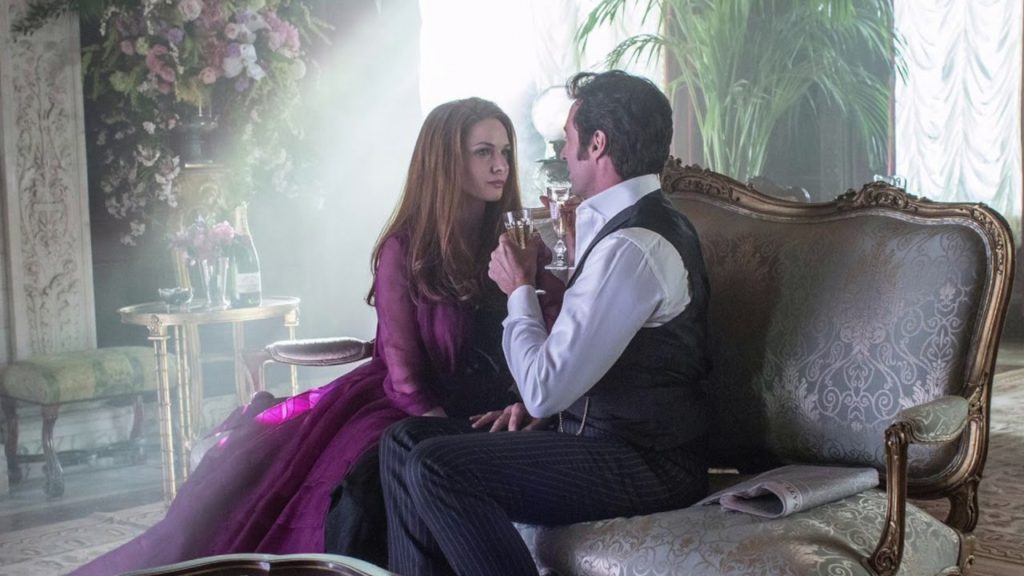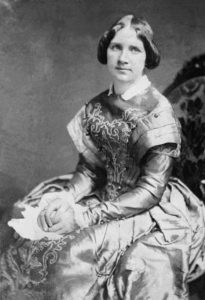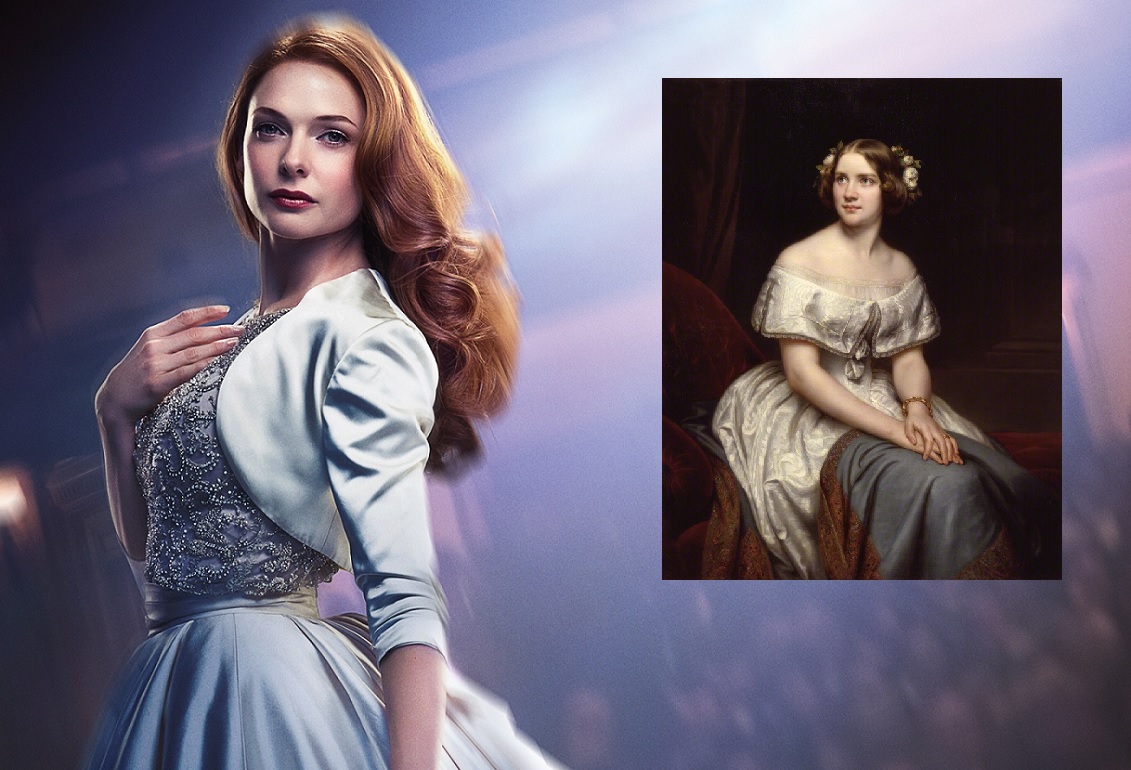Justice for Jenny Lind
I recently saw The Greatest Showman, the original movie musical loosely based on the life of P.T. Barnum, and I was pleasantly surprised by how much I liked it. The songs were much better than I was expecting (of course, “This Is Me” did just win a Golden Globe), and I really enjoyed all of the characters. The only character I came out of the theater hating was opera singer Jenny Lind.
And therein lies the problem with The Greatest Showman. The major problem, of course, is that it absolutely whitewashes the history and moral character of a man like P.T. Barnum. (Actually, when I read up on Barnum after seeing the movie, what I learned about him made me sort of angry that I liked the film so much.) I expected that to some degree. This isn’t the first time a movie has retconned a historical figure and made them seem like a better person than they actually were. Another, slightly smaller, not insignificant sin this movie has committed is the unbelievable character assassination against Jenny Lind.
In the movie, Barnum meets Jenny – a renowned opera singer known as “The Swedish Nightingale” – in Queen Victoria’s court and is immediately infatuated with her. In an effort to seem more respectable, he weasels his way into an introduction and vows to make her as famous in America as she is in Europe. She agrees, and he leaves his circus/museum to go on tour with her. He borrows heavily in order to fund the tour and her appearance fees, including taking out a mortgage on his house without telling his wife, Charity.
During the course of the tour, Jenny falls in love with Barnum, and one night she makes a move on him. He rejects her, since he seemingly finally remembers he has a wife back in New York, and Jenny is livid. Her singing suffers, and the night before he goes back to New York, she plants a kiss on him right on stage. This is, naturally, photographed by numerous journalists, and appears on the front page of the paper, prompting Charity to leave him. When his museum burns to the ground, he learns he doesn’t have the money to rebuild because Jenny quit the tour and he lost everything.
Needless to say, I came out of that movie absolutely hating Jenny. What a horrible person! What kind of woman gets mad that a married man won’t kiss her, and then quits her own tour in a jealous huff? Well, it turns out, no one, because that is not how it happened at all.

The real Jenny Lind did meet Barnum while he was in Europe and agreed to the tour if he paid her fee in advance, which he did. She then donated the proceeds to charity, primarily donating to ensure free education for poor children in Sweden. The tour was a huge success, and Barnum made four times his original investment. When Jenny realized how popular it was, she asked for a new contract so that she could negotiate for more money, which she also gave to charity.
In the end, Jenny was uncomfortable with Barnum’s management techniques. Tickets were so popular that they were auctioned off, and Jenny asked for more tickets to be made available at reasonable prices. She also did not like the way he marketed her tour. So after 93 concerts out of the promised 150, she exercised a clause in her contract that allowed her to withdraw from the tour, which she went on to finish under new management.
In real life, there was absolutely no romance between Jenny and Barnum, and they parted ways amicably. Why then, does The Greatest Showman insert an unnecessary romantic entanglement and make Jenny out to be the villain?
It’s because The Greatest Showman has created a version of P.T. Barnum that probably didn’t exist. This Barnum is a good guy™, who worked his way up from poverty to impress the parents of the woman he loved. This Barnum filled his museum with “curiosities” to give people better jobs than they would get normally. (In the film, Barnum first sees 22-year-old Charles Stratton – the man who will become Tom Thumb – he and his mother are being denied a loan. In real life, 4-year-old Stratton was a distant cousin of Barnum’s.) This Barnum would never behave in such a manner that someone like Jenny Lind would want to sever business ties with him. Therefore, to complete the image that The Greatest Showman wants to portray, Jenny had to be the villain.

That’s a problem. That’s a big problem. I don’t think a film with heavyweights like Hugh Jackman and Michelle Williams needs to smear someone’s name for cheap drama. And in 2018, we shouldn’t be seeing a female character torn down in order to prop a male character up. If The Greatest Showman didn’t want Barnum’s image tainted (or the image they were trying to create), it could have come up with a plausible solution to get him off Jenny’s tour without turning her into a jealous, spiteful person.
He could have simply missed his family and his museum and wanted to leave. There was no reason to have Jenny kiss him, or have his wife leave him. The climax of the movie is the museum burning down; there didn’t need to be romantic drama on top of that. And if they wanted the romantic drama, it could have simply come from the fact that Barnum didn’t tell Charity he took a mortgage out on the house. It was already there; during the scene in which Charity walks out, she seems more upset that he didn’t tell her about the loan than the photo of Jenny kissing him.
In this time of greater attention to the #MeToo campaign, of the Women’s March, of women banding together to get equal treatment, it’s frustrating that films continue to vilify women in such a manner, to perpetuate the idea that a jilted woman only seeks to ruin the life of the man who rejected her. What’s worse is that they sabotage Jenny as a character so that Barnum looks better in comparison. Why should Jenny have to suffer for an overly-polished version of P.T. Barnum? Why does he get to come out of this movie looking like a saint, while Jenny Lind gets dragged through the mud? Hell, even the (male) theater reviewer who hates Barnum gets a redemption scene. Jenny just gets trashed.
I want some justice for Jenny Lind. I want to know how, in the almost decade it took for this movie to be made, no one ever sat down and went, “Do we really need this in the film?” Because the answer is no; it really isn’t necessary. Jenny and her tour may have been an important part of the narrative, but the rest of it is only there so that we remember that Barnum is a good guy™, and that’s kind of despicable.
Author: Jamie Sugah
Jamie has a BA in English with a focus in creative writing from The Ohio State University. She self-published her first novel, The Perils of Long Hair on a Windy Day, which is available through Amazon. She is currently an archivist and lives in New York City with her demon ninja vampire cat. She covers television, books, movies, anime, and conventions in the NYC area.
Help support independent journalism. Subscribe to our Patreon.
Copyright © The Geekiary
Do not copy our content in whole to other websites. If you are reading this anywhere besides TheGeekiary.com, it has been stolen.Read our


I have to say I respectfully disagree. Imthis movie is pure fantasy. Names and dates twisted to make something new which is what a lot of successful movies are anymore. But I’m this case, I didn’t see her as the bad guy. I saw her as a woman who believed the glitz and glamor (just like Barnum’s wife) and upon realizing it wasn’t what she thought it was, she imploded it. She said, when you’re careless with other people, you bring ruin upon yourself. sure, her character is meant to further the plot line which is to remind PT of the person he was supposed to be. But I saw that as his short coming, not her deviousness. And Charity did leave him, suggesting to me that she also knew the correct person to blame.
Fair point, and thank you for the argument. I did not get that sense. For me, it’s the kiss on stage that seals the movie’s attitude towards her. That she kisses him in public, in front of cameras, says to me that she’s doing that on purpose, to hurt him. It didn’t need to happen that way. He was leaving the tour, and Charity had various reasons to walk out. If it was meant to be a goodbye, it could have happened in private. That she did it in public seems like a calculated move to ruin the respectable reputation he’d been aiming for with that tour, and that makes her character seem unnecessarily cruel.
Charity didn’t leave him in real life, she died and he remarried but still stated in his biography that she was the love of his life etc.
I actually entirely agree~ The movie basically skips over how used the characters feel by Barnum even after acknowledging it in the film itself. I love Lind’s song but I entirely agree that this movie unecessarily villainized her to maintain their false image of P T Barnum~
Yes, I feel like “From Now On” is meant to be his apology to the others, but I also thought they got over it too easily.
Its a great movie, ‘based’ on a true story. It was never meant to be a historical account. Just enjoy this work of mostly fiction about people that no one remembers anymore and move on. Feminists will literally cry at anything these days… Silent when it comes to the horrific treatment of women in the middle east however… Wonder why that is?… 🙂
Thank you!!! I mean, so what!!! She is the bad guy. She’s a girl. Does that matter? Who cares! All these liberal feminists think every things about them. Well, its not. Women In the US get fair treatment and fair pay compared to men, unlike women in the middle east, but they don’t care about that do they? They need to stop complaining about their virtually perfect lives and grow up. I’m a girl. I don’t complain about this nonsense.
I didn’t personally see any romantic attraction on Barnum’s part, just a fascination with his newest shiny attraction. She had earnest, respectable singing ability, which dazzled a man who had only been employing folks with oddity-based abilities until then (even the trapeze, which takes years of work and discipline to master, had no place in an Opera house. Funny what people will exalt or deride…). I think he was just naive and genuinely adored his wife, and when you’re not attracted to someone, it’s perplexing and throws you off when they bring attraction into your interactions. He was, frankly, too wrapped up in his work to notice or cut it off at the pass because her voice was a bankable ability and he knew it would be the boost his reputation needed. It was an infatuation, yes, but professional, not sexual. I agreed that her “logic” was utterly batshit, though.
This movie is definitely not fair to Jenny Lind. I knew of her story beforehand, having read of an account of Hans Christian Andersen. Lind turned down the famous storyteller , and this made him so sad that he wrote “The Nightingale.”
Understandably, movies portray real life figures in a more colourful way. Jenny Lind and PT Barnum are not attractive people, and no one would think these two would fall for each other. But put together High Jackman and Rebecca Ferguson, and one can totally imagine a romance between these two. This love triangle was also shown in a previous movie about Barnum, so this isn’t the first time.
However, I don’t think it’s fair to paint Barnum in a much kinder light as a humanist (when all accounts show he was merely an opportunist) and then to portray Lind as a femme fatale. Not only that, she quits the show because Barnum nobly rejects her, thus putting his finances in jeopardy.
They needn’t have set this up in a way to show that Barnum is almost saintly, as he turns down a smitten songstress who spitefully leaves him. Before going, she kisses him in front of the press. Not only did she ruin him monetarily, she didn’t care that this could affect his marriage, even after having met his wife and two kids.
This is totally opposite to the real Lind, who was said to be truly virtuous. She donated all her proceeds to charity, and even turned down several suitors.
If I were a descendant I would complain that this movie smears her character. There are audience members who won’t go beyond the film and will think that Lind is like this.
That they had to besmirch her character just to set up Barnum as the “good guy” is really tacky and two-dimensional. This makes “The Greatest Showman” hard to swallow.
Musicals about historical figures needn’t deify their protagonists. For example, “Evita” wasn’t shy about portraying Eva Peron as a social climber and one who was mocked by high society. It didn’t detract from her story; it made her more interesting, more human.
TGS couldn’t put a worthy story together about Barnum without making him into a different person altogether. They might as well just make a fictional story about a circus promoter instead of pretending this is about PT Barnum.